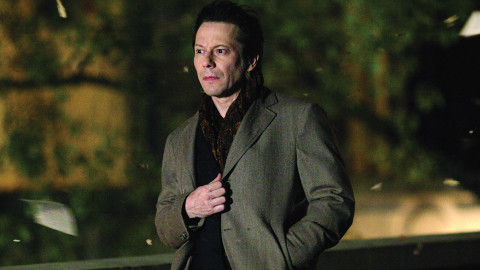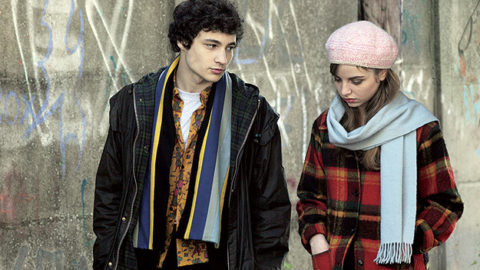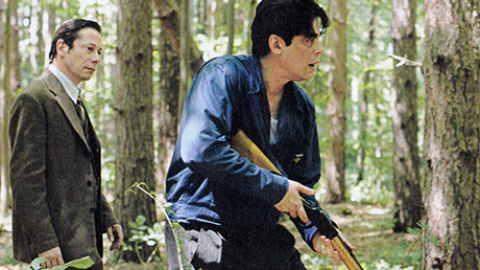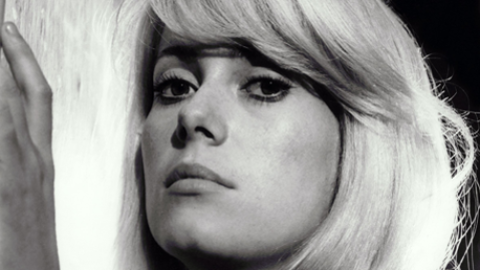Film of the Week: Oh Mercy!
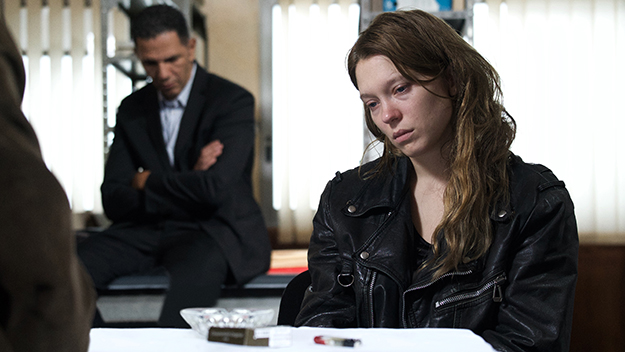
Images from Oh Mercy (Arnaud Desplechin, 2019)
In French, the word “thriller” is sometimes translated as film policier, sometimes more colloquially as polar, which derives from the first. The exact differences are hard to define, although a quick search online suggests this distinction: a film policier is shot from the point of view of the cop, and a polar from that of the gangster (and a thriller, apparently, from that of the victim). We could get very pedantic about the fine points here, but as far as I can see, Arnaud Desplechin’s new film Oh Mercy, which just premiered in competition in Cannes, is cent pour cent a film policier. Yes, the story is told from the point of view of the cops, plural, but it’s also a very precise account of how those cops operate in a realistic day-to-day work situation: in other words, to get sub-generic about it, it’s what you call a police procedural.
That might seem a departure for Desplechin, and indeed it is—as radical a deviation for him as his 2013 U.S.-set drama Jimmy P: Psychotherapy of a Plains Indian. Desplechin’s films since then have tended to conform to type: My Golden Days (2015) was another chapter of his quasi-autobiographic study of alter ego Paul Dédalus, and a mesmerizing study of young love; Ismael’s Ghosts (2017) was a somewhat wearingly goofy study of a filmmaker in crisis and, bien sûr, the women in his life.
Oh Mercy, however, is something different, and Desplechin clearly sees it that way: in his director’s statement, he says, “Nearly all my films have been romantic. Too much! It’s this “too much” that I desired.” By contrast, “Today I want a film that sticks to reality, in every way. That returns to raw material and which, through the art of the actor, can burn.” Maybe it loses something in translation from the French, coming across awkwardly like one of those manifestos that Lars von Trier used to fire off so liberally. But we can’t doubt Desplechin’s sincerity, especially when he quotes the late French critic Serge Daney, who once said, “Already a film buff from a child, from the playground on, I rejected society. But I think that cinema helped me come to terms with the world.” Oh Mercy is clearly the film where Desplechin explicitly comes to terms with the world, and he does so in a very personal way: the film’s French title is the highly poetic Roubaix, une Lumière (Roubaix, a Light), Roubaix being the Northern French town where the director grew up and where he has set a number of films. Written by Desplechin and Léa Mysius (his co-writer on Ismael’s Ghosts and director of 2017’s Ava), Oh Mercy is adapted from a 2008 TV documentary by Mosco Boucault, Roubaix, Commissariat central (Roubaix, Central Precinct), and, as an opening title card points out, the crimes Desplechin narrates are all drawn from reality.
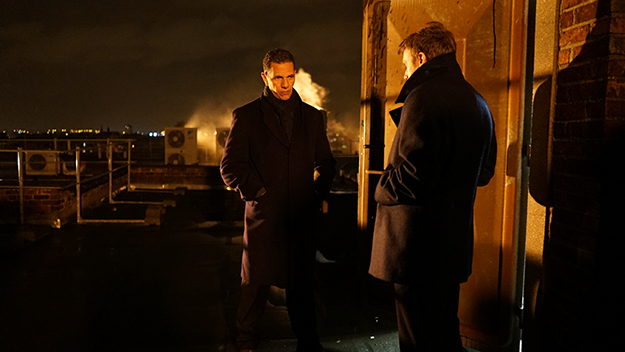
The film is partly a lament for his childhood home as Roubaix, we learn, is a city on the skids, France’s poorest commune, with massive unemployment and a large swath of the population living in extremely deprived conditions. In the film, the man who seems to know Roubaix best—to the point of personally embodying its history and its conscience—is Captain Daoud (Roschdy Zem), a police inspector of Algerian immigrant origins, who arrived in the city aged seven. He’s the commanding officer at the city’s central precinct, which is where the story’s various crimes are investigated. Some are simple: the case of a burning car and a man who staggers into the police station with neck burns proves to be something that Daoud sees through in an instant, and that he unpicks with insightful delicacy in a series of slyly comic scenes featuring Philippe Duquesne. Others are more challenging—the apparent arrival in town of a serial rapist, the case of a teenage runaway. Then there’s the story that forms the film’s core—a house fire that gradually becomes something considerably darker, involving two young women (Léa Seydoux and Sara Forestier) living together in a run-down neighborhood.
French directors generally associated with art cinema have often turned to the film policier, and specifically to dramas set in police stations, to explore a more objective type of realism, and to examine (sometimes theologically charged) questions of truth and justice, or sometimes the stresses of public duty on the private life: among them, Maurice Pialat (Police), Bertrand Tavernier (L.627), Xavier Beauvois (Le Petit Lieutenant), and Maïwenn (Polisse). In Oh Mercy, the private life takes something of a backseat: we know something about Daoud’s family history and his Maghrebin identity (at home, he has a picture on his wall showing life in an Algerian bled, its idealized sunny colors a stark contrast with the grey days and bulb-lit nights of Roubaix), and we also see this quiet, solitary man has an enthusiasm for horses but not betting. It’s what stops him for becoming one of those cops for whom the job effectively has become their life. That’s a danger that possibly awaits Louis (Antoine Reinartz), a lieutenant who’s newly joined the precinct, although his private life is more painfully charged: he’s a deeply religious man, agonized by the question of sustaining faith in a world of darkness, and his prayers and his letters to his father are sometimes heard in voiceover, differently inflecting what would otherwise be the film’s observational realism.
One thing that’s striking about Oh Mercy is the way it shows us just how much performance goes into police work. Many of the interrogation scenes here are built around a traditional good cop/bad cop dynamic, with one or more coppers losing their temper, or feigning to, while another, usually Daoud, remains the voice of compassionate calm, the one who decides when a pause for breath is needed, offering a coffee or a cigarette. Just how much this is a carefully stage-managed routine is shown by one of the officers, Benoît (Stéphane Duquesnoy), who apparently can’t keep his short fuse from igniting; in fact, in an earlier scene, we’ve seen Benoît called in to ask some questions in a rape case, because he’s known to be a specialist in solicitous tact.
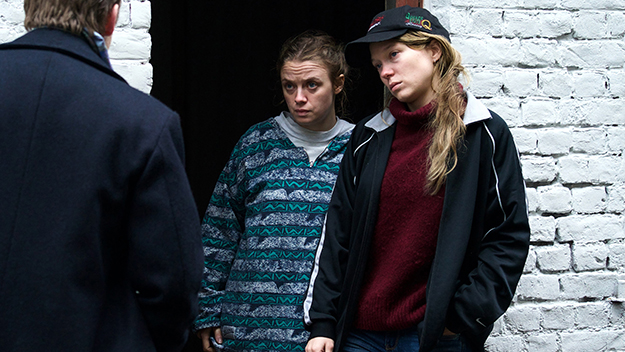
There’s something not strictly realist in the character of Daoud, who declares that he’s always able to tell who’s lying and who’s telling the truth, who’s guilty and who’s innocent. Desplechin is perhaps asking us to swallow a lot in this representative of the wise cop as all-knowing god, or universal judge, or perhaps psychoanalyst (if you follow the Lacanian definition of the shrink as the one “supposed to know”—and after all, few directors are as overtly committed to analysis and its structures as Desplechin). The figure of the wise cop who also resolves the conflicts of the world by bringing justice is a familiar one in fiction—think of Georges Simenon’s Maigret, but think also of Porfiry in Dostoevsky’s Crime and Punishment, which Desplechin also cites as a comparison alongside Hitchcock’s The Wrong Man (the only film that guided him, he claims, although he also refers to Melville’s Le Cercle Rouge and Le Samourai).
That Daoud comes across so plausibly as a super-cop in an intimate minor key is down to the performance of Roschdy Zem, an axiomatic presence in French cinema since the early ’90s (he was also in Le Petit Lieutenant). Zem’s tender, lined face and soft-spoken, wry delivery offer Daoud as something of a zen master whose composure has been refined through years of fire (not just at work but also through the return of his family to Algeria, and the rejection by his nephew, a furious angry young man whom he visits in prison).
The other great performance here belongs to Sara Forestier, as one of the two co-dependent young women caught up in Daoud’s investigation. Playing the more confident and intelligent of the two, Léa Seydoux, her face pallid and worn, gives a typically fine performance as Claude, a single mother who knows how to play the game of survival. The surprise, however, is Forestier who, like Seydoux, had a breakthrough with Abdellatif Kechiche (2003’s Games of Love and Chance). Some of her subsequent roles, notably in comedies, have consolidated her persona in that film as an irrepressibly mouthy free spirit, and she’s sometimes overplayed it somewhat. Here she’s terrific, Marie’s lined brow and her lost blue eyes racked with anxiety and fear: there’s an extraordinary moment when she’s detained in a cell and we see her face in the window as she calls out repeatedly, “Claude… Claude…” And there’s another when the facts of the case finally come out, and as she rides in the back of a police vehicle, we realize that the lines have at last fallen off her brow: truth as catharsis.
If it’s the performances that, as Desplechin says, are the medium for the film’s address of raw material, it’s other touches that makes this truly a Desplechin film: the camerawork and sometimes borderline expressionist lighting by Irina Lubtchansky, with its sulfur-yellow night scenes; those voiceovers from Louis that ought to feel incongruous but don’t; the characteristically lush, starkly emotive orchestral score by Grégoire Hetzel. In its way, this is as much a philosophical and theological Cannes 2019 title as Terrence Malick’s A Hidden Life, but it’s a substantially more pragmatic and convincing one: to suggests that there’s somehow grace to be found on France’s meanest streets may seem a rarefied ambition, and perhaps even an improper one in a film drawn from hard reportage. But it’s something that Desplechin pulls off, with not a jot of his usual cinematic dandyism; for me, it was one of the most welcome surprises of this year’s festival.
Jonathan Romney is a contributing editor to Film Comment and writes its Film of the Week column. He is a member of the London Film Critics Circle.



